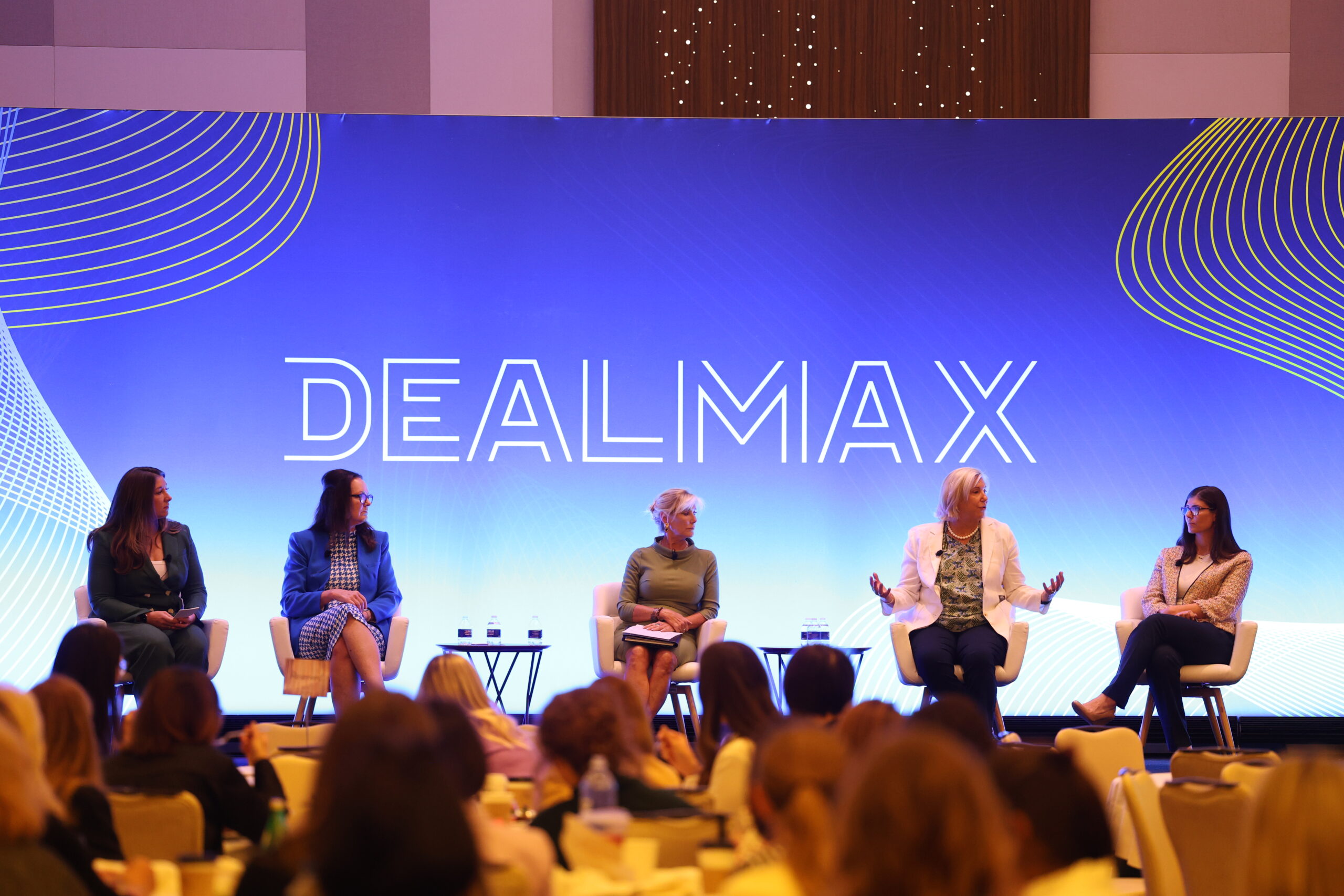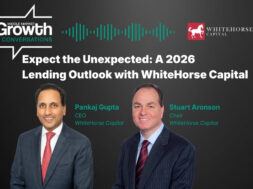DealMAX 2024 Recap: Exits, AI and Closing the M&A Gender Gap
Day 2 DealMAX panelists discussed trends shaping the future of dealmaking

Amid a challenging market, the M&A dealmaking environment is in flux for reasons that span beyond financial hurdles.
LPs are pressuring funds to return capital, forcing private equity investors to get creative with their exit strategies. Meanwhile, artificial intelligence continues to dominate conversations about the future of dealmaking, raising questions about how the technology will affect human capital. And as those shifts in the workforce occur, M&A leaders are also considering how to promote DEI initiatives and close the gender gap within the industry.
Day 2 of DealMAX was packed with insights on these influential forces driving the future of M&A. Read more on what experts had to say below.
Plexus Capital’s Jester Calls this Market “The Great Exhaustion”
ACG Event Recap
WHAT: DealMAX Day 2 of Programming
WHERE: ARIA Resort & Casino in Las Vegas, NV
WHEN: May 1, 2024
THE TAKEAWAY: Panelists explored the future of M&A, from overcoming the ‘great exhaustion’ to fuel exits, to assessing the real-world impact of AI and closing the gender gap in dealmaking.
Exit activity is at an all-time low, according to data presented by PitchBook, and M&A activity hasn’t improved much yet. But panelists speaking on the “How to Solve the Exit Dilemma?” panel on Tuesday shared some signs that a more fruitful market is on the horizon.
U.S. private equity exit volume was at $79.2 billion so far this year through Q1, compared to $279.1 billion in 2023 and $293.3 billion in 2022, and down from a record high of $831.7 billion in 2021, according to PitchBook, the panel sponsor. Tim Clarke, lead analyst at PitchBook, said sponsors are trying to grow companies longer and get higher valuations in sales. Valuation EBITDA multiples are at an average of 9.5x this year and last, compared to 8.9x in 2022 and 11x in 2021.
LPs are pressuring private equity firms to sell, though, and fundraising is expected to suffer unless GPs deliver exits. “We think fundraising will hit an air pocket in the second half of this year. The distribution factor to LPs will have a residual effect of undermining the fundraising for two to three years,” Clarke said.
We think fundraising will hit an air pocket in the second half of this year.
Tim Clarke
PitchBook
Trying to characterize the current market, Jay Jester, partner at Plexus Capital and the ACG Legend Award winner this year, called it “the great exhaustion.”
“We had this amazing run from the end of the global financial crisis up to Q3 of ’21. And we kept waiting for something to turn that was going to end this market, but everybody kept hiring, volumes went up, prices went up and it’s almost like we just ran out of gas. Everybody was exhausted,” Jester said.
Speakers said high-quality companies are continuing to trade while lower quality companies might be waiting it out, but sellers getting comfortable with lower valuations could break the dam. “If you own a high-quality business that’s performing well, I’m sure your advisors constantly tell you to enter the market,” said Justin Abelow, managing director at Houlihan Lokey.
Although speakers agreed the variety of quality among companies going to market is lacking and there were a lot of busted auctions last year, things are improving. “I feel as though deal flow is picking up, cost of capital is going down, multiples are going up, public equity markets are continuing to be strong, so it does feel better,” said Charlie Gifford, senior partner at New Heritage Capital. “There is still a lag on the quality side, but I think it’s getting better.”
Translating AI Into a Competitive Advantage
Discussions of AI can be heavy on big, forward-looking predictions, but light on actionable insights. But at “The Rise of AI Technology and Its Impact on M&A” panel, Richard Lawson, CEO of HGGC; Gavin Slader, head of investment banking at Citizens JMP; Richard Lichenstein, chief private equity data officer at Bain & Co.; and Alex Western, CEO of Terminus Capital Partners, sat down with moderator Jim Obsitnik, CEO of Sourcescrub, which sponsored the panel, to share actionable steps firms can take to incorporate generative artificial intelligence now.
Lichenstein noted that firms may already be surveying their portfolios for risks associated with AI, but often fail to use the same rigor to search for AI-related opportunities. “Look for those up-side cases,” he said. And while that awareness of risks might hold firms back from experimenting with AI, Slader recommended that firms keep exploring the possibilities and not fear failure: “It will put you on the path to finding those couple of things that do work.”
But firms don’t need to recreate the wheel, Lawson said: “My advice would be to take a look and think, who else is doing this well?” PE leaders can look to other firms that are already deploying AI successfully and learn from their approach.
Western delivered strategic advice, noting that while firms may anticipate AI taking over repetitive tasks and freeing up time for knowledge workers, many aren’t thinking about what will come after that. “The question really becomes how to redeploy that freed-up time,” he said. “That actually might translate into a competitive advantage.”
Flexibility Key to Closing the Gender Gap in M&A
Despite the private equity industry’s progress toward gender parity, women continue to be underrepresented at the highest levels of the asset class. Speakers at the women’s breakfast on Day 2 of DealMAX offered steps firms can take to attract and retain female employees.
Grant Thornton Partner Melanie Krygier, who moderated the “Increasing and Enhancing Women’s Roles in the M&A Market Through Smart Talent Acquisition Strategies” panel, cited McKinsey data that shows women hold 48% of the entry-level roles in private equity but only 20% of managing director positions.
Women hold 48% of the entry-level roles in private equity but only 20% of managing director positions.
Traditional hours and travel requirements are one obstacle to keeping women in the industry. Allowing for more flexibility is the most important change that firms can adopt, according to Beth Cahill, president and senior managing director of investment bank Windsor Capital. “Even if I’m involved in raising children or taking care of an elderly parent and my time commitment has changed for the day, I have other times that I can provide to the firm,” she said. The 9-to-5 schedule is already obsolete, she added, since employees regularly take calls or respond to emails after-hours.
Investment professionals notoriously have grueling travel schedules, but they’re not the only roles in private equity. Operating partner roles or positions in capital markets tend to have fewer travel requirements and offer alternative career paths, said Pam Hendrickson, vice chairman of private equity firm The Riverside Company.
Erin Carroll, partner at executive search firm BraddockMatthewsBarrett, added that a broader approach to hiring is another way to increase diversity within financial services firms. Rather than focusing on traditional candidate pools, we can “really look at what the skills are that we’re trying to solve for, and how best can we solve for those skills,” she said.
Still, panelists acknowledged that M&A is a demanding field and encouraged women in junior roles to stick it out. “This is a rigorous industry we’ve all chosen to be a part of, right? It is a life choice that we’ve all made, and I think having more and more of us in it is great,” said Gretchen Perkins, partner at PE firm Avance Investment Management. “But to continue, we need to maintain our enthusiasm for what we’re doing. I would just encourage you to hang in there, because at a certain level in our industry—whether it’s investment banking or private equity—you have a lot of flexibility to create your schedule.”
The women’s breakfast and panel were sponsored by Grant Thornton, which offered CPE accreditation for attendees.
Middle Market Growth is produced by the Association for Corporate Growth. To learn more about the organization and how to become a member, visit www.acg.org.


